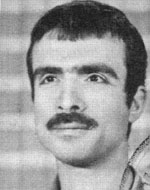Khoury, Eliyahu
Son of R ‘Shlomo and Sa’adona. He was born on October 13, 1933 in Djerba, Tunisia. He was descended from a family of rabbis. At the age of four he was fed by his father, and the orphaned family experienced great distress and suffering. Nevertheless, Elijah’s mother, who studied at least several years in Talmud Torah, was concerned. As a boy he had to go to work, to help his mother’s agriculture and his three sisters. At the age of eighteen he married his choice of Lev, Aziza. Elijah sought to immigrate to Israel, and in 1956 he set foot on the land of Israel, first living in the Hatzerim transit camp near Be’er Sheva, but when he heard that a religious town was being established, he decided to move to Netivot. The family grew up – they had three daughters and three sons – and it was not easy for him to keep the house in his meager wage, but the work ethic to which Eliyahu was blessed provoked astonishment among all those who knew him. In the early days, when the town of Netivot had just sprouted from the desert, its first inhabitants used to pray in the shul, and only On Shabbat, they performed their prayers in the school’s dining room, and Eliyahu was the one who made the necessary arrangements to provide some comfort to the worshipers. He was up before dawn, before he could go to work, to take care of all the arrangements in the synagogue – including summoning a minyan and several minyanim one by one – he initiated regular classes in Kabbalah and recited Psalms in Zuta. He urged the residents to come to the Selichot prayer. It was he who used to build the sukkah next to the synagogue each year. “In pleasant ways and in the paths of peace, with kindness and love, young people and adults approached prayer and fear of heaven,” testified the head of the Netivot local council in his eulogies, adding: “In society, who knows his measurements? When he saw two of them talking, he moved away from them like a rainbow. ” Indeed, innocent justice was in all its ways, and in his lifetime he gained public recognition. Due to his low medical profile, Eliahu was appointed to the Haganah in the early days of his service in the army, and was a loyal and devoted soldier to all military tasks he undertook in his civilian life: On 10 January 1977, He was then laid to rest at the military cemetery in Netivot. He left behind a wife, three sons, three daughters, a mother and three sisters. Eliyahu’s death left a deep and painful scar on the Lev of his family, friends and admirers. To commemorate his memory, he published – among other commemorative works – a book called Yad Eliyahu, in which, along with Torah novellae and commentary, he expressed appreciation for his personality.
